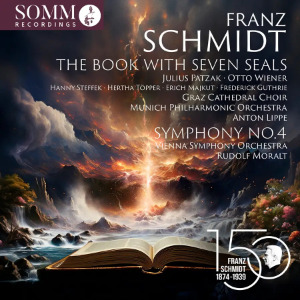
Franz Schmidt (1874-1939)
Symphony No. 4 in C Major (1933)
Das Buch mit sieben Siegeln (The Book with Seven Seals) (1937)
John: Julius Patzak (tenor); Voice of the Lord: Otto Wiener (bass)
Hanny Steffek (soprano); Hertha Töpper (alto); Erich Majkut (tenor); Frederick Guthrie (bass)
Franz Illenberger (organ)
Graz Cathedral Choir
Munich Philharmonic Orchestra/Anton Lippe
Vienna Symphony Orchestra/Rudolf Moralt (symphony)
rec. 7 September 1954, Musikverein, Vienna (symphony: mono); January 1962, Stefaniensaal, Graz (Stereo)
Somm Ariadne 5026-2 [2 CDs: 157]
It’s been very encouraging over the last few years to witness a renewed interest and revival in Franz Schmidt’s music. Whilst acknowledging that the four symphonies have had a fair amount of exposure, this hasn’t been the case for some of his other music. There are two operas: Notre Dame and Fredigundis, an Oratorio: The Book with Seven Seals, chamber music and some solo piano and organ works. He seemed happiest working mainly in large monumental structures, embracing 19th century forms and developing the traditions he inherited from Schubert, Brahms and Bruckner, in deference to an Austro-German lineage. His music is firmly tonal, yet rhythmically daring and harmonically adventurous. His life had its fair share of tragedy. His wife was committed to a mental institution and later murdered in 1942 as part of the Nazi’s euthanasia program, and his daughter Emma died after giving birth to her first child.
Many regard the Fourth as Schmidt’s greatest symphony, his crowning achievement as a composer. It was written in 1933, shortly after the death of his daughter Emma. The German conductor Oswald Kabasta, a great advocate of Schmidt’s music, gave the premiere in 1934 with the Vienna Symphony Orchestra. The work is cast in one continuous movement, comprising of four distinct sections. A cello solo in the elegiac second section was described by Schmidt as “a requiem for my daughter”. The section which follows is a fugal scherzo, with the final section a recapitulation of the opener. Rudolf Moralt’s 1954 recording with the Vienna Symphony Orchestra, issued on an Epic LP (LC 3164) has been a benchmark recording for this work and, until now, has only been available as a download (Naxos 9.80262). There’s some superfine playing from the VSO, and the instrumental detail is superb. Moralt captures all the grief and sorrow embedded in the score. A deep sense of tragedy and loss permeates this evocative reading, embraced within a Brucknerian spaciousness. I’m just amazed how wonderful this 1950’s mono recording sounds.
Four years later Schmidt composed his oratorio The Book with Seven Seals (Das Buch mit sieben Siegeln) on themes from the biblical Book of Revelation of Saint John. It’s structured in two distinct parts. Oswald Kabasta gave the first performance in Vienna in 1938. The work is not through-composed but laid-out in the classic oratorio design. An ambitious project, Wagnerian in scale, it calls for substantial orchestral forces, six soloists and a large choral contingent. I’ve never heard it before. The music sounds to me very approachable, the musical language being late-romantic. Schmidt rings the changes between organ solos, sections for individual soloists, pairs of soloists, choir and orchestra.
The team of soloists bring authority to the proceedings, with Julius Patzak in his role as John being particularly impressive. He delivers his solos in fine style. The other soloists sing with character and purity, supported by the Munich Philharmonic Orchestra under Anton Lippe. They play with great spirit and finesse. The balance between the voices and the orchestra is ideal. The chorus is excellent and very well placed in the sound picture to make the maximum dramatic effect. The stereo recording was first issued on a 2 LP set (Amadeo AVRS 5004/05), and later on CD by the same label.
These desirable historical audio documents have been expertly restored by Lani Spahr. He’s a fine audio restoration engineer, and his dedication and skill have yielded very positive results. He’s also contributed the booklet notes. German sung text with English translation is available via a QR code on the final page of the bookle.. All told, this project has been an unmitigated success, and a true labour of love. The release coincides with the 150th anniversary of the composer’s birth, and both works were recording premieres.
Stephen Greenbank
If you purchase this recording using a link below, it generates revenue for MWI and helps us maintain free access to the site




















